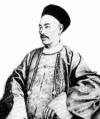Huang Zunxian poet from China was born on May 29, 1848, had 56 years and died on March 28, 1905. Poems were written mainly in Chinese language. Dominant movement is chinese dynasties.
Biography
Huang Zunxian (simplified Chinese: 黄遵宪; traditional Chinese: 黃遵憲; pinyin: Huáng Zūnxiàn; Wade–Giles: Huang Tsun-hsien, May 29, 1848 – March 28, 1905), courtesy name Gongdu (公度), was a Chinese official, scholar, and writer, active during the late Qing Dynasty. As a poet he published more than a hundred poems. He was born in Jiayingzhou, now Mei County, Guangdong, and died 57 years later in the same place. His game-changing contributions to China made him a recognised figure of his time, and a namesake foundation has been established in his honour. Huang's former residence is now marked as a public museum.
Huang was born May 29, 1848 in Jiayingzhou (now Mei County), Guangdong, China to a family of Hakka heritage. His father Huang Hung Chow was a scholar-official (Juren or 举人) and served the courts of the Qing dynasty.[1] At age three, he witnessed the effects of the greatest land reforms in China.[2] As a toddler, the younger Huang could recite the famous Chinese anthology Thousand Families Poems (千家诗) and as a nine-year-old child studied poems from the Tang dynasty. His life took a turn a few years later, during the Taiping Rebellion, when he was robbed of many of his possessions. He applied to be a Juren, like his father, when he became of age in 1877. Despite heavy competition, he found success and was posted to Tokyo, Japan to serve as the Imperial Chinese Embassy's Counsellor.[1] In September 1880, he published Korea Strategy a paper regarding the high level plans of Korea (unified as it then was). Huang suggested that China and Korea become good allies. The work is described by one source as "a work of destiny that determined the modern history of East Asia".[3] While in Japan, he did some editorial work for the Japan World Magazine,[4] looked into aspects of the medicine of the country,[5] and noted how much the country had progressed through time and published his studies in a book, Treaties of Japan[6] (printed 1890[7]). Then-Emperor Guangxu was fascinated with the work and invited Huang to detailedly explain it to him in person. It was partially because of Huang's book that Guangxu amended some rules in China.[6] Huang is also considered to be a philosopher, having analysed, discussed, and questioned the framework of China.[8][9] His influences in philosophy included the Enlightenment figures Rousseau and Montesquieu.[10]
Afterwards in 1882, Huang was assigned as Consul-General in San Francisco, United States. During his time there, he realised how wealthy the immigrant Chinese had become, and how much of an asset they were to China. Huang wrote a poem about Frederick Bee, an official at the Chinese Consulate.[11] After seven years in the United States, he moved back to his home country China. In 1890, he relocated to London to act as the Counsellor of the Chinese Embassy; one year later he was reassigned to Singapore to become the Consul-General there. He witnessed how similar the Singaporean Chinese, both rich and generous, were to the native Chinese. Disagreeing with China's policy of not allowing overseas Chinese to return to the country, and torturing them if they did so, Huang composed a formal request to the Emperor to do away with the rule, offering the view that China was "driv[ing] fish into other people's nets". The request was accepted and on January 29, 1894, it was announced that the Chinese overseas were no longer barred from returning to China.[12] In between, Huang was Hunan Province's Salt Intendant[7] and he started the Journal for Contemporary Affairs.[13] The change of policy was widely celebrated and reported; Huang was soon to be appointed China's ambassador to Japan. However, before that could materialize, the ruler of China changed from Guangxu to the toddler grandchild of Empress Dowager Cixi (see Hundred Days' Reform). With Guangxu detained, Huang's career as a diplomat ended.[14] He slammed Cixi's coup but at the same time expressed his relief at being freed of his diplomatic duties.[15]Huang had a few takes on race. As a teenager he expressed that every person "is made from yellow clay". Decades later he asked, "Why is the yellow race not the only race in the world?"[16] Huang enjoyed penning poems.[17] He was also patriotic towards China, and once described it as a gold-paved nation.[18] He was well-liked as a poet and his poetry works received positive criticism, with one source citing him as "the most distinguished poet among the late nineteenth-century reformers".[19] His influences in poetry included Wei Yuan, Gong Zizhen, and Jin He.[20] His grandmother was a Lady Li, whose death when Huang was still a child supposedly put him in "deep sorrow", as evidenced in a poem pertaining to Li's tomb.[21] Most of Huang's poems relate to world affairs of his time,[22] including foreign ones, such as the presidential elections in the United States.[23] In total, he published more than a hundred poems.[24] After he died, an anthology of his poems, Poems of the Human Environment (人境廬詩草), was published and remains popular in China.[25] A proponent of the late Qing Poetic Revolution,[26][27] select poems of his include: The Mountain Song, The Cherry Blossom Festival, The Fog of London,[24] Songs of the Taiping Rebels,[28] On The Road to Wuqing,[29] and Expelling the Visitor.[30] In his lifetime, he also showed an interest in opening schools in various countries in Asia.[31] Huang and Liang Qichao were close friends.[13] Huang extensively toured many parts of Asia, his favourite being Malaysia.[17] His nephew, Parkcane C. Hwang, was the founder[32] and manager of the Bank of China in Singapore.[33]






